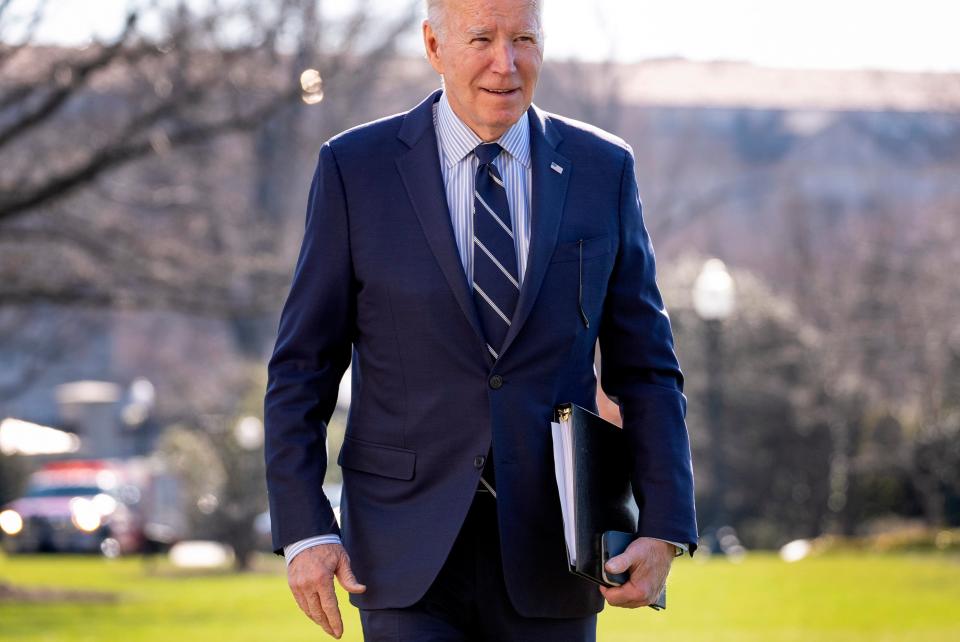President Joe Biden’s response to Iranian proxy aggression fails to meet the moment
The writing may have been on the wall, but 45 years ago, it was difficult to see that the Shah of Iran was nearing his downfall. Similarly, regime leaders celebrating the anniversary of the 1979 Iranian Revolution this week may not fully recognize that the Islamic Republic is flirting with disaster. At the current pace, and given the availability of Iranian intelligence and advanced weaponry to its terrorist proxies, it may be only a matter of time before the U.S. is forced to strike at Iran directly.
According to press reports, there have been more than 160 recorded attacks targeting American soldiers in Iraq and Syria by Iranian proxies since October, the USS Carney and its crew of 329 was attacked last month with anti-ship cruise missiles, and freedom of navigation — which the U.S. considers a national interest and pledged to defend — is under threat around the entirety of the Arabian peninsula by Iran and Iran-backed forces. Arab and Israeli allies, too, have come under attack. Then, last month, three U.S. servicemen were killed by a militia funded, armed and trained by Iran — an act of war by any definition.
President Joe Biden responded to their deaths in a manner that did not fit the moment. In launching a limited attack against Houthi targets in Iraq and Syria, he satisfied no one and left Iranian leaders feeling confident and capable. It allowed Iran to continue to believe its own rather obscene claim that because it does not enjoy full command and control over its proxy forces, it should not be held responsible for buying the gun, loading the gun and providing instruction on how and when to use the gun.

After the Hamas-led Oct. 7 massacre in Israel, the U.S. reportedly warned Iran that the U.S. “would retaliate against any aggression,” which prompted Iran to send its IRGC commander “between Iran, Syria and Lebanon to try to keep actions by Iran’s allies from spiraling out of control.” But the results were mixed, at best.
In addition to attacks originating in Yemen, Iraq and Syria that threaten the U.S., Hezbollah regularly attacks northern Israel and is contributing to the largest internal displacement of Israelis in the country’s history. More than 96,000 Israelis have been evacuated from northern communities by the Israeli military for their safety. The time has come to up the ante with an ultimatum to Iran: abandon support for terror or risk direct confrontation.
Disconnecting the detonators it has placed throughout the region won’t be easy for regime leaders. It can be difficult to walk away from a strategy that you’ve invested in for more than four decades. But the upside could be substantial. Like lifting Iran’s compulsory hijab law, abandoning support for terror groups would likely have widespread domestic support, which the regime desperately needs.
As one analyst in Iran observes, inflation is rising, pension funds are shrinking, and Abbas Abdi, who led the takeover of the U.S. Embassy in 1979 that resulted in my being taken hostage, has become openly critical of the regime’s “faulty decision-making system, which has worsened in the past few months and whose outcome is usually the intensification of the crisis.” Further, Iranians will be called to the polls next month for parliamentary elections, and turnout may fall to a new record low — a reflection of the public’s discontent with rigged elections and hard-line rule.
Of course, Iran is more likely to continue to risk direct confrontation, even though it would be unwilling to survive one, just as it has chosen to risk continued unrest by maintaining its compulsory hijab laws.
Opinion: After US troops killed, Biden can no longer avoid dealing with Iran and its proxies
History suggests that even if Iran fails to abandon terror and ultimately absorbs an attack, however, it will move to de-escalate. After all, the regime did not respond in any meaningful way after the Taliban took over a consulate in Mazar-i-Sharif and killed 10 Iranian diplomats in 1998, nor did it respond to the deaths of Hezbollah’s Imad Mughniyeh, Islamic Revolutionary Guard Corps Commander Gen. Qassem Soleimani, or more recently the head of the IRGC Quds Force’s Unit 2250 in Syria, Sayyed Razi Moussavi.
The U.S. has never held Iran accountable militarily for the actions of its proxy forces. That should change. To force a change in behavior, Biden should give Tehran a reason to believe that its exposure to risk is high. It is the best chance a president has had to starve Iran-backed terrorists of money, weapons and training and support the brave Iranians who are rejecting a future under the regime.
Barry Rosen is a survivor of the 1979-1981 Iran hostage crisis, a senior adviser at United Against Nuclear Iran and a founding member of Hostage Aid Worldwide.
This article originally appeared on Delaware News Journal: Biden response to Iranian proxy aggression fails

